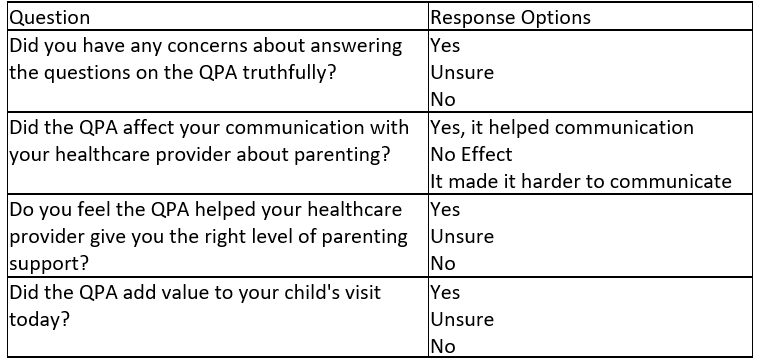Back
General Pediatrics: Primary Care/Prevention
Category: Abstract Submission
General Pediatrics VI
117 - Parents are Receptive to a Novel Parenting Assessment Tool Integrated into Pediatric Primary Care
Monday, April 25, 2022
3:30 PM – 6:00 PM US MT
Poster Number: 117
Publication Number: 117.410
Publication Number: 117.410
Victoria N. Lawson, Vanderbilt University School of Medicine, Nashville, TN, United States; Anna Whitney, Vanderbilt University School of Medicine, Nashville, TN, United States; Jacqueline Antoun, Vanderbilt University School of Medicine, Nashville, TN, United States; Laura E. Henkhaus, Vanderbilt University, Nashville, TN, United States; Merrill M. Stoppelbein, Vanderbilt University School of Medicine, Nashville, TN, United States; Kathryn Carlson, Monroe Carell Jr. Children's Hospital at Vanderbilt, Nashville, TN, United States; Seth J. Scholer, Vanderbilt University School of Medicine, Nashville, TN, United States

Victoria N. Lawson, BA
Medical Student
Vanderbilt University School of Medicine
Nashville, Tennessee, United States
Presenting Author(s)
Background: The American Academy of Pediatrics recommends addressing discipline as a part of primary care, but this is not routinely done. A standardized parenting assessment tool could fill this gap by facilitating routine conversations, but it is not known if parents would be receptive to answering questions about their discipline practices.
Objective: To assess parents’ perspectives on the acceptability and usefulness of a parenting assessment tool integrated into pediatric primary care and to examine differences by sociodemographic factors.
Design/Methods: The Quick Parenting Assessment (QPA) is a validated, 13 item survey that assesses for healthy and unhealthy discipline practices used in the past month (Figure 1). Scores range from 0-10 and >2 is considered elevated. In a clinic serving low-income families, the QPA was integrated into well child visits for four different ages. Parents completed the QPA during intake and providers were encouraged to review it with parents during the visit. After the visit, 417 parents were invited to complete a survey about their experience and 374 (90%) agreed to participate. For this cross-sectional study, we focus on 157 parents who reported that the QPA was reviewed by the provider. Key measures include parents’ concerns about completing the QPA and parents’ opinion of the QPA’s effect on communication about parenting, helping the provider give the right level of parenting support, and added value (Table 1). We calculated frequencies of parents’ responses to the key measures and used Pearson’s chi-squared test to assess for associations with sociodemographic factors.
Results: Participants represented racial/ethnic diversity. 42% were Black, 17% were White, and 32% were Hispanic . 26% spoke a language other than English. 24% of QPA scores were elevated. Most parents (95%) felt comfortable completing the QPA truthfully. Most parents reported that the QPA helped facilitate communication (55%), helped the provider give the right level of parenting support (89%), and added value (80%). An elevated QPA score was associated with a greater likelihood of reporting the QPA helped communication (p=.027). Having only one child was associated with a greater likelihood of reporting the QPA added value (p=.009). No significant associations were found for other sociodemographic factors (Table 2).Conclusion(s): A diverse sample of parents were receptive to a parenting assessment tool, finding it acceptable and useful. The tool facilitated conversations about discipline, especially for parents using unhealthy practices. The findings support the use of the QPA in pediatric primary care.
CV- Victoria LawsonCV- Lawson 12.17.21.pdf
Table 1: Key Study Measures
Objective: To assess parents’ perspectives on the acceptability and usefulness of a parenting assessment tool integrated into pediatric primary care and to examine differences by sociodemographic factors.
Design/Methods: The Quick Parenting Assessment (QPA) is a validated, 13 item survey that assesses for healthy and unhealthy discipline practices used in the past month (Figure 1). Scores range from 0-10 and >2 is considered elevated. In a clinic serving low-income families, the QPA was integrated into well child visits for four different ages. Parents completed the QPA during intake and providers were encouraged to review it with parents during the visit. After the visit, 417 parents were invited to complete a survey about their experience and 374 (90%) agreed to participate. For this cross-sectional study, we focus on 157 parents who reported that the QPA was reviewed by the provider. Key measures include parents’ concerns about completing the QPA and parents’ opinion of the QPA’s effect on communication about parenting, helping the provider give the right level of parenting support, and added value (Table 1). We calculated frequencies of parents’ responses to the key measures and used Pearson’s chi-squared test to assess for associations with sociodemographic factors.
Results: Participants represented racial/ethnic diversity. 42% were Black, 17% were White, and 32% were Hispanic . 26% spoke a language other than English. 24% of QPA scores were elevated. Most parents (95%) felt comfortable completing the QPA truthfully. Most parents reported that the QPA helped facilitate communication (55%), helped the provider give the right level of parenting support (89%), and added value (80%). An elevated QPA score was associated with a greater likelihood of reporting the QPA helped communication (p=.027). Having only one child was associated with a greater likelihood of reporting the QPA added value (p=.009). No significant associations were found for other sociodemographic factors (Table 2).Conclusion(s): A diverse sample of parents were receptive to a parenting assessment tool, finding it acceptable and useful. The tool facilitated conversations about discipline, especially for parents using unhealthy practices. The findings support the use of the QPA in pediatric primary care.
CV- Victoria LawsonCV- Lawson 12.17.21.pdf
Table 1: Key Study Measures

